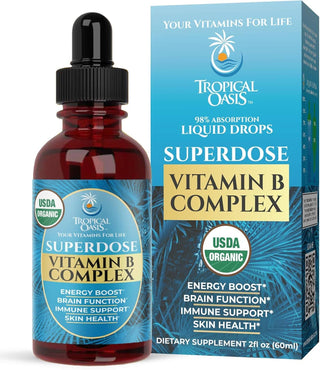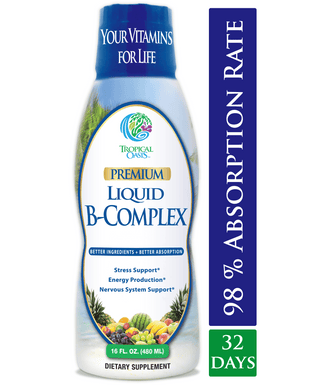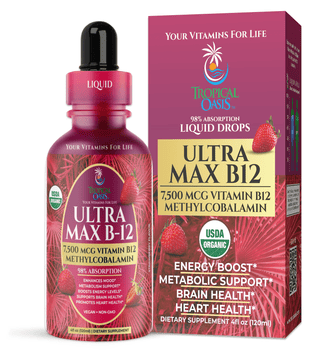Vitamin B12 For Neuropathy
As a trusted leader in liquid vitamins and supplements, Tropical Oasis provides high-quality, effective solutions for your health needs. With over two decades of experience in the industry, we pride ourselves on delivering products that combine the best of nature and science to support your overall well-being.
You’re viewing 1-3 of 3 products
Key Takeaways:
- Nerve Repair: Explore the critical role Vitamin B12 plays in nerve repair and protection, helping to alleviate neuropathy symptoms.
- Serious Illness: Understand how Vitamin B12 deficiency can lead to serious neuropathic health issues.
- B12 Sources: Learn about the various dietary sources and supplementation options available to maintain adequate Vitamin B12 levels for nerve health.
Understanding Vitamin B12
Vitamin B12, also known as cobalamin, is a water-soluble vitamin that plays a vital role in various physiological functions. It’s crucial for maintaining healthy nerve cells, supporting the production of DNA, and aiding in the formation of red blood cells. Unlike other vitamins, Vitamin B12 is unique because it is not naturally synthesized by the human body; instead, it must be obtained through dietary sources or supplements.
This vitamin is mainly found in animal-based foods like meat, fish, poultry, eggs, and dairy products. For individuals who follow a vegetarian or vegan diet, fortified foods or supplements are often necessary to meet their Vitamin B12 needs.
How Vitamin B12 Deficiency Affects Nerve Health
Vitamin B12 is integral to the formation and maintenance of myelin, the protective sheath around nerves that ensures the smooth transmission of nerve impulses. When myelin is damaged or degraded due to a lack of Vitamin B12, nerve signals can become slow or blocked, resulting in a range of neurological symptoms.
The symptoms of Vitamin B12 deficiency-related neuropathy can include:
- Tingling or Numbness: A common symptom, particularly in the hands and feet, due to impaired nerve function.
- Burning Sensations: Some individuals may experience a burning feeling, often described as painful.
- Weakness: Muscle weakness can occur when motor nerves are affected by the deficiency.
- Coordination Problems: Poor nerve function can lead to difficulties with balance and coordination.

Benefits Of Vitamin B12 For Neuropathy Management
Vitamin B12 offers several benefits for managing neuropathy, particularly when the condition is related to or exacerbated by a deficiency of this essential nutrient. Here are some of the key ways that Vitamin B12 can help you manage neuropathy:
Nerve Repair And Regeneration
One of the most significant benefits of Vitamin B12 is its role in nerve repair and regeneration. By contributing to the production and maintenance of myelin, the protective sheath around nerves, Vitamin B12 helps to repair damaged nerves and restore proper nerve function. This regenerative process can reduce the pain, tingling, and numbness often associated with neuropathy, improving both mobility and comfort.
Reduction Of Pain And Discomfort
Supplementation with Vitamin B12 has been shown to significantly reduce the intensity of pain in individuals suffering from neuropathy. This is especially relevant for those with conditions like diabetic neuropathy, where nerve pain can be debilitating. By enhancing nerve health and function, Vitamin B12 can alleviate the chronic discomfort often accompanying neuropathy, leading to a better quality of life.
Prevention Of Further Nerve Damage
Adequate levels of Vitamin B12 not only assist in repairing existing nerve damage but also play a critical role in preventing further deterioration. This is important for people with ongoing health challenges, such as diabetes, who are at a higher risk of developing or worsening neuropathy. By maintaining sufficient B12 levels, individuals can protect their nerves from ongoing damage, helping to preserve nerve function over the long term.
Support For Overall Nervous System Health
Beyond its direct effects on neuropathy, Vitamin B12 is crucial for the overall health of the nervous system. It supports cognitive function, helps regulate mood, and maintains energy levels, all of which can be negatively impacted by neuropathy. Ensuring adequate Vitamin B12 levels contributes to a well-functioning nervous system, which is vital for overall well-being, particularly for those managing chronic nerve conditions.
Potential Synergistic Effects With Other Treatments
Vitamin B12 supplementation can be effectively integrated with other neuropathy treatments, such as pain management strategies, physical therapy, and lifestyle modifications. When combined with these interventions, Vitamin B12 may enhance their effectiveness, leading to more comprehensive management of neuropathy symptoms. This synergistic effect makes Vitamin B12 a valuable component of a multifaceted approach to neuropathy care.
Boost Your Energy with Tropical Oasis Ultra Max Methyl B12 Liquid Drops
Tropical Oasis Ultra Max B12 Liquid Drops provide 7500mcg of organic methyl B12 in a fast-absorbing liquid form, offering 98% absorption. This high-potency formula supports energy, metabolism, and red blood cell formation. The drops come in a strawberry flavor and are vegan, non-GMO, and gluten-free. The liquid form ensures quicker results compared to pills, helping combat fatigue and boost daily energy.
The Connection Between Vitamin B12 And Neuropathy
Medical research has established a relationship between Vitamin B12 and neuropathy. Vitamin B12 is crucial for the health of the nervous system, and its deficiency is a known cause of peripheral neuropathy. This connection primarily revolves around the vitamin's role in producing and maintaining myelin, the protective covering of nerves.
When the body lacks sufficient Vitamin B12, myelin integrity deteriorates, leading to nerve damage. This damage disrupts the normal transmission of signals between the nerves and the brain, resulting in the symptoms associated with neuropathy, such as pain, tingling, and numbness.
In addition to preventing the onset of neuropathy, Vitamin B12 has been studied for its potential to manage and alleviate the symptoms of existing neuropathy. Research suggests that Vitamin B12 supplementation may help repair damaged nerves, reduce pain, and improve nerve function in individuals suffering from neuropathy, particularly when the condition is caused by a deficiency of the vitamin.
Sources Of Vitamin B12: Dietary And Supplement Options
Maintaining adequate Vitamin B12 levels is essential for nerve health, particularly for individuals managing neuropathy. A combination of dietary sources and supplements can achieve this.
Dietary Sources of Vitamin B12
Vitamin B12 is naturally found in animal-based foods. Here are some of the richest dietary sources:
- Meat: Beef, pork, and lamb are excellent sources of Vitamin B12. Organ meats, such as liver and kidneys, are particularly high in this nutrient.
- Fish And Seafood: Fish like salmon, tuna, and trout, as well as shellfish like clams and crab, are rich in Vitamin B12.
- Poultry: Chicken and turkey are good sources, and dark meat contains higher levels of Vitamin B12 than white meat.
- Dairy Products: Milk, cheese, and yogurt are accessible sources of Vitamin B12, especially for those who may not consume meat.
- Eggs: Although eggs contain Vitamin B12, it’s present in smaller amounts compared to meat and fish. Including eggs in the diet can still contribute to overall B12 intake.
Vitamin B12 Supplements
For those who may not obtain enough Vitamin B12 from their diet, supplements are a practical alternative. This includes individuals following a vegetarian or vegan diet, older adults, and those with medical conditions affecting nutrient absorption. Here are some common forms of Vitamin B12 supplements:
- Oral Supplements: These are available in several forms, including tablets, capsules, and liquid drops. Oral supplements are an easy and effective way to boost Vitamin B12 intake.
- Sublingual Tablets: These tablets are designed to dissolve under the tongue, allowing for direct absorption into the bloodstream. This method can be beneficial for individuals with absorption issues.
- Vitamin B12 Injections: In some cases, healthcare providers may recommend Vitamin B12 injections, particularly for individuals with severe deficiencies or those who have difficulty absorbing the vitamin through the digestive tract. Injections ensure that the body receives an adequate and immediate dose of Vitamin B12.
- Fortified Foods: Many plant-based foods, such as breakfast cereals, plant-based milk (soy, almond, etc.), and nutritional yeast, are fortified with Vitamin B12. These can be particularly helpful for individuals on a vegan or vegetarian diet.
Read also:
- Top Vitamins That Boost Your Energy Levels Naturally
- Organic Vitamins: Everything You Need to Know for Better Health
- Understanding B12 and B Complex: Differences and Benefits
Sources:
- Julian, T., Syeed, R., Glascow, N., Angelopoulou, E., & Zis, P. (2020). B12 as a Treatment for Peripheral Neuropathic Pain: A Systematic Review. Nutrients, 12(8), 2221. https://doi.org/10.3390/nu12082221
- Karedath, J., Batool, S., Arshad, A., Khalique, S., Raja, S., Lal, B., Anirudh Chunchu, V., & Hirani, S. (2022). The Impact of Vitamin B12 Supplementation on Clinical Outcomes in Patients With Diabetic Neuropathy: A Meta-Analysis of Randomized Controlled Trials. Cureus. https://doi.org/10.7759/cureus.31783
- Pratama, S., Lauren, B. C., & Wisnu, W. (2022). The efficacy of vitamin B12 supplementation for treating vitamin B12 deficiency and peripheral neuropathy in metformin-treated type 2 diabetes mellitus patients: A systematic review. Diabetes & Metabolic Syndrome: Clinical Research & Reviews, 16(10), 102634. https://doi.org/10.1016/j.dsx.2022.102634
- Bouattour, N., Sakka, S., Farhat, N., Kacem, H. H., Hdiji, O., Dammak, M., & Mhiri, C. (2018). Vitamin B12 deficiency neuropathy: A clinical and electrophysiological study. Neurophysiologie Clinique, 48(3), 130. https://doi.org/10.1016/j.neucli.2018.05.007
Frequently Asked Questions
Yes, Vitamin B12 deficiency can occur in non-vegetarians and vegans due to factors like poor absorption, certain medications, or gastrointestinal conditions like Crohn’s disease or celiac disease. Even if your diet includes B12-rich foods, these issues can still lead to a deficiency that may result in neuropathy.
The timeline for improvement can vary depending on the severity of the deficiency and the extent of nerve damage. Some people notice a reduction in symptoms within a few weeks, while for others, it may take several months of consistent supplementation to see significant changes.
Vitamin B12 is generally considered safe even at high doses because it is water-soluble, meaning excess amounts are typically excreted in the urine. However, extremely high doses over an extended period should still be taken under medical supervision to avoid any potential complications, especially in individuals with certain health conditions.
Vitamin B12 may help with nerve repair in chemotherapy-induced neuropathy, but it is important to consult with an oncologist before starting supplementation, as it might interact with certain chemotherapy drugs. Clinical guidance is crucial in these cases.
Methylcobalamin is a form of Vitamin B12 that is often recommended for neuropathy because it is directly involved in nerve repair. However, other forms like cyanocobalamin are also effective. Discuss with your healthcare provider to determine which form is best for your situation.
Maintaining adequate levels of Vitamin B12 can help prevent neuropathy, particularly if you are at high risk due to conditions like diabetes or if you have a history of Vitamin B12 deficiency. Regular monitoring and early intervention can be key in prevention.



